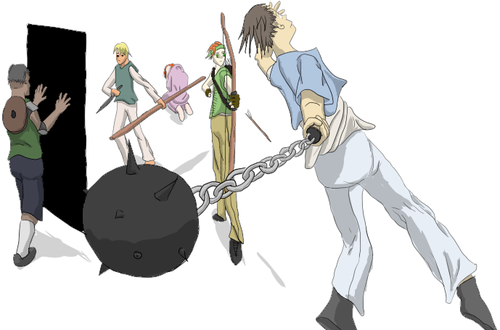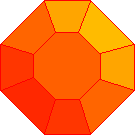Basic actions
The following action types are available to all characters, unless an exception is stated.
Standard Actions

|
A standard action can be converted freely to a move action.
Cower: Until you next take an action, creatures against whom you have total cover cannot hit you without shooting through that cover, and ranged attacks from 100 meters or more away can't hit you at all. Get +1 to your stealth until your next turn.
Assault: Make 2 non-heavy attacks, and an additional one for each weapon you are wielding beyond the first. If you are a Hero (rather than a member of a regiment), you may make those attacks at any point(s) during your turn.
Heavy Attack: Make a single attack, which becomes heavy if it wasn't already.
Rush: Move one of your speeds, then make a single non-heavy attack.
Cut Out: Make a single non-heavy normal or sunder attack, with a -1 penalty if it's melee or a -2 penalty if it's ranged. If the attack inflicts any wounds, you may specify an item type: if there were any items of that type implanted in the target, one such item falls out of them in addition to the wounds inflicted. If this was an unarmed attack, you may choose to be holding that item.
Tie Up: Make a single unarmed attack against the GD of an opponent you are in a grapple with while you have rope or chain in one of your hands. If the attack would wound, you may tie the target up by making an items check, effectively leaving them paralyzed. Each of their turns they may attempt to escape by making a legerdemain check that's at least 3 points higher than your items check was.
Ranged Guard: Pick a 90 degree cone. You get +2 Perception against things in that cone, and -2 Perception against things outside of that cone. When you notice a creature or object moving a meter or taking a Standard Action within the cone, you may attack them with a non-heavy ranged attack (for every full quarter of its speed it moves or additional Standard Action it takes, you may attack them again). The Ranged Guard ends when you have used it to make 2 attacks (plus an additional one for every weapon you are wielding beyond the first) or when your next turn begins, whichever comes first. If your Perception (after the bonus) is less than their Stealth, you never manage to notice them in time for this attack.
Search: Find poorly-hidden things in a 5 meter long, 90 degree cone.
Tactile Search: Find poorly- and decently-hidden things in a 1 square meter region within reach.
Cure: You attempt to cure a wounded non-[ Machine ] creature within reach. Every 60 times this action has been performed on a target, make a DC 6 Nature check, and if successful, heal 1 wound.
Repair: You attempt to repair a wounded [ Machine ] creature or object within reach. Every 60 times this action has been performed on a target, make a DC 6 Items check, and if successful, heal 1 wound. Objects that have been reduced to -2 or less HP cannot be repaired. In the case of destroyed terrain objects, this repairs up to a four by four meter section.
Stop Drop and Roll: Cure all creatures and objects within reach of the on fire condition.
Move Actions
Aim: Your next attack this turn gets +1 to Accuracy, or +2 to Accuracy if the attack isn't Heavy. This bonus does not stack when you aim multiple times for a single attack.
Move: You can use one of your movement speeds to travel up to the normal distance.
Pay Attention: Get +1 to your perception until your next turn.
Sneak: Get +1 to your stealth until your next turn, and you can use one of your movement speeds to travel up to half the normal distance.
Stand Up: Stop being prone.
Open/Close Heavy Door: Open or close a door that weighs up to three times your carrying capacity if you're pulling, or six times if you're pushing.
Lesser Actions
Lesser actions can be done on your turn, except while you're being interrupted by someone else acting on your turn, as with an immediate action or a ranged or melee guard. There are endless types of minor fidgets and other insignificant acts a character is free to do, but here are some of the most important ones.
Talk: You can hold a conversation.
Drop Item: You let go of some things you are holding.
Deep Inhalation: Fill your lungs with air, to get the maximum number of rounds before suffocation.
Lie Down: Become prone.
Draw Item: You can place items you are wearing or unsecured items within reach into your hands.
Plug Ears: Plug your ears, quartering the distance at which you can hear. This uses two hands, and stops when you use those hands for something else.
Open/Close Door: Open or close a door that weighs less than your carrying capacity.
Immediate Actions
An immediate action may be done at any time, interrupting the current action or event immediately. For each immediate action so used, you must expend a move action as soon as you are able (you can expend a move action for this during your turn at any time). You cannot take immediate actions if doing so would cause you to have more than 2 move actions pending in this way. If you interrupt an attack in a way that would take you out of range of that attack, it may still hit you (see Leaving Range).
Grab Ledge: If you would fall off of something, you may grab onto the edge with a successful DC 4 Agility check.
Catch: When an object is thrown to you, and the throw attack hits AD 3, you may attempt to catch the object with a successful DC 4 Agility check.
Foil Search: Use this when someone makes a Search or Tactile Search. Make a Legerdemain check and divide by 2; if the result is equal to or greater than the searching creature's Perception, they fail to find any hidden things within your reach that you don't want them to find. That same result with a -1 penalty can be used to automatically Foil Search further Searches for 1 round.
Combination Actions
Delay (Standard Action AND/OR Move Action): Don’t take those actions now. Immediately after any creature’s turn ends, you may set your initiative count to come after that player, and take a turn that consists only of the actions you spent to Delay. If your next turn comes up before this happens, the actions are wasted. The new turn does not trigger events that occur on the beginning or end of every turn. If multiple characters attempt to stop Delaying at once, they must roll initiative (d6+Agility) to see who gets to go first.
Melee Guard (Standard Action AND Move Action): Until your next turn, when you notice a creature or object moving a meter, taking a Standard Action within a radius described by your melee reach plus one of your non-Run speeds, or passing within your reach, you may move up to and attack them with a non-heavy melee attack (for every full quarter of its speed it moves or additional Standard Action it takes, you may attack them again). The Melee Guard ends when you have used it to make 2 attacks (plus an additional one for every weapon you are wielding beyond the first) or when your next turn begins, whichever comes first. The Melee Guard can’t grant more total movement than your relevant non-Run speed. You get +2 Perception against things within range of your current melee guard area, and -1 Perception against things outside of that area.
Ready (Standard Action AND Move Action): Specify a standard, move, or lesser action. At any time before your next turn, you may interrupt the current event to take the specified action.
Concentrate (Standard Action AND Move Action): This action does nothing by itself. You can't talk while concentrating.
